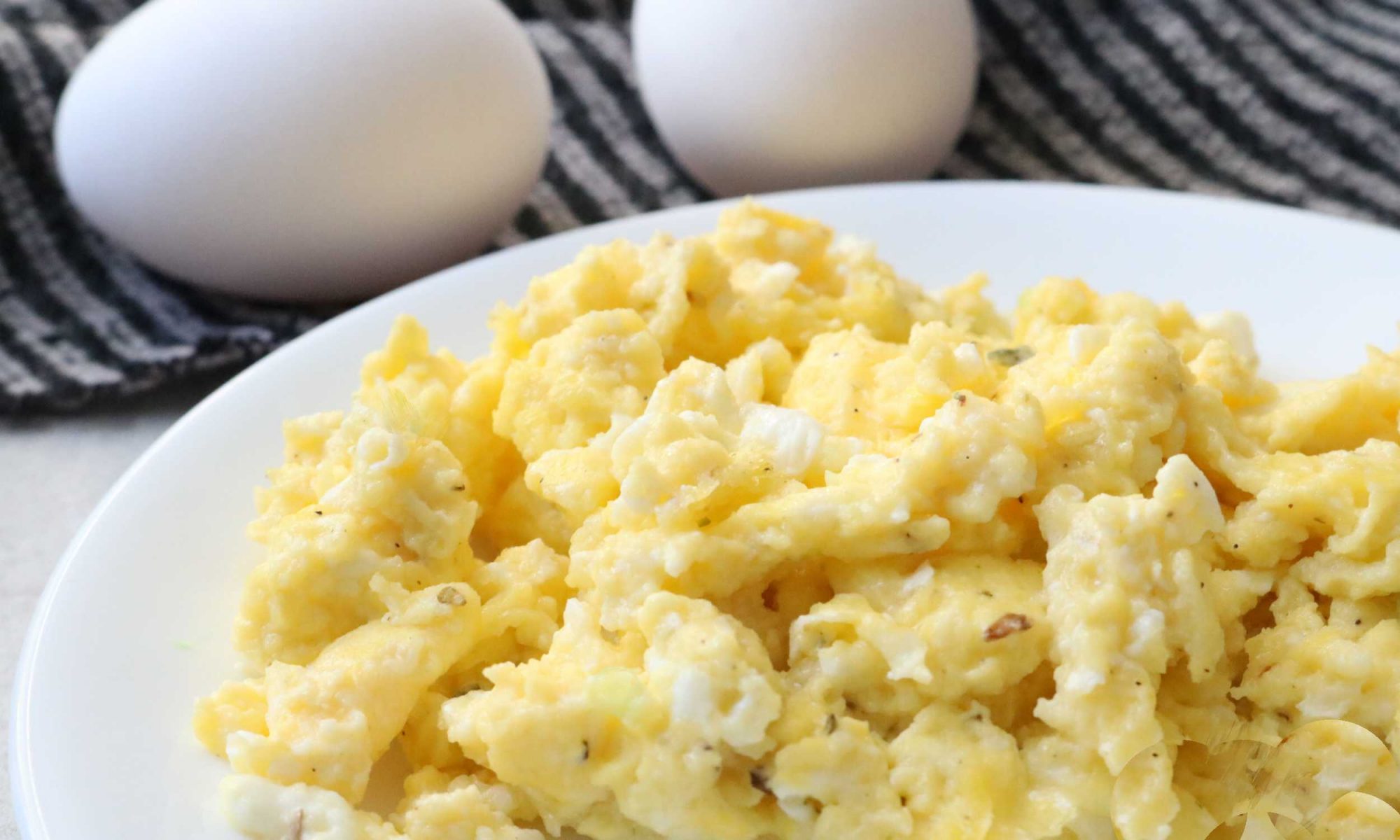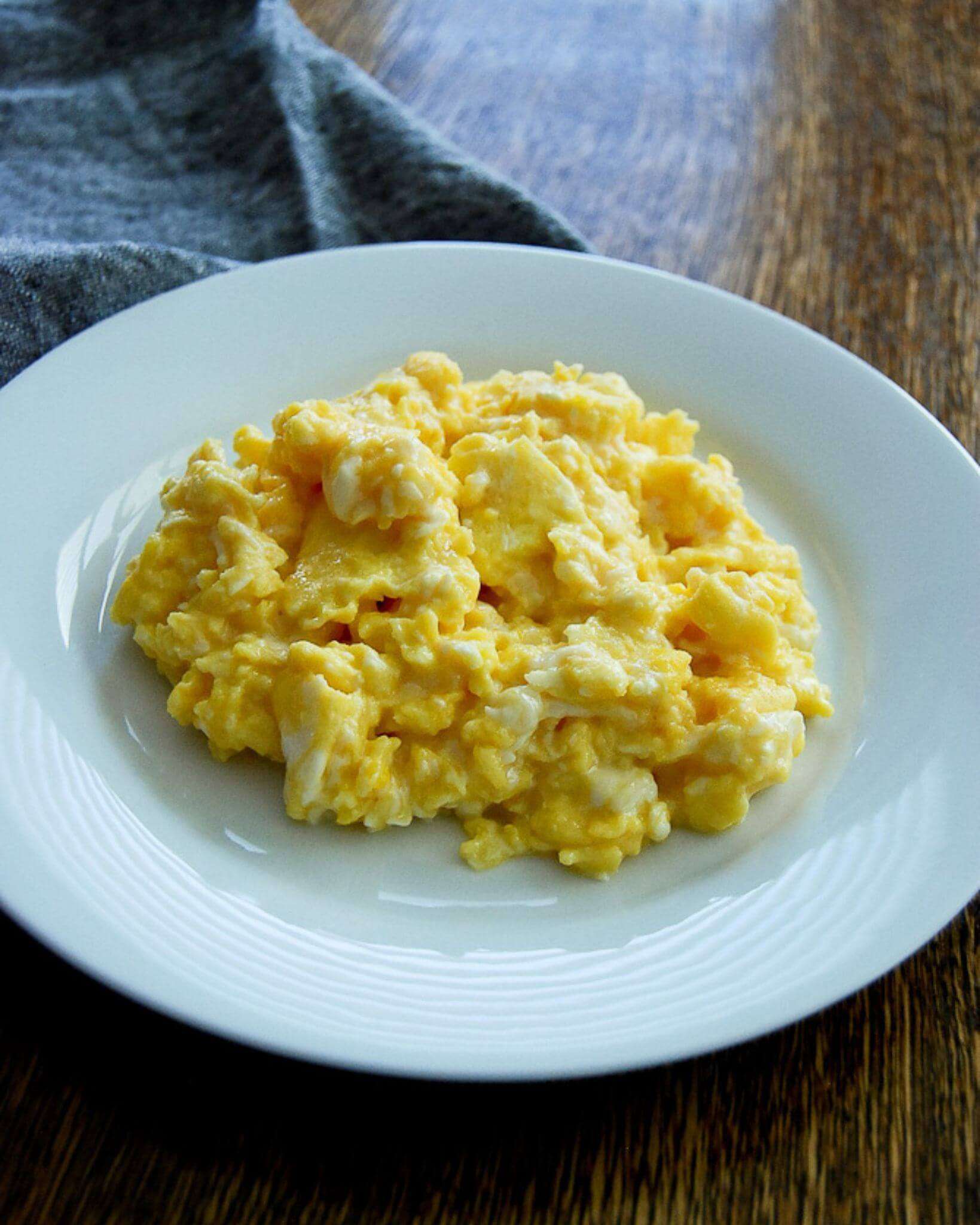Want to know how to make creamy scrambled eggs? This recipe for Soft, Buttery, Creamy Scrambled Eggs is the best. Cooking the eggs over very low heat makes them silky smooth and is the BEST way to make sure they come out perfect every time. Great for breakfast, lunch, or dinner!
Most folks are either a scrambled egg person, or they’re not. And I believe that it’s 100% dependent on how they’ve had them prepared in the past. Cooked too quickly and they turn into rubbery dry clumps. But cooked properly, the scrambled eggs become soft, creamy layers of buttery goodness, enjoyed just as much on their own (eggs and toast, anyone?) as they are stuffed inside a breakfast burrito or piled onto a sandwich.
These creamy scrambled eggs are a staple in our house. Most weekend mornings you’ll find us making these soft and creamy eggs, accompanied by a thick piece of toast and the occasional slice of bacon. They’re the ultimate in easy breakfast foods (or lunch, or dinner), since even when cooking them slowly they never take more than 15 minutes, start to finish. And they’re a great way to work some protein into your daily diet, without too many calories (only 91 calories per scrambled egg!). I promise – these are THE BEST CREAMY SCRAMBLED EGGS in my opinion and this recipe for perfect scrambled eggs will change the way you think about them.
The beauty of making good creamy scrambled eggs is that there really is no secret ingredient here. All you need are eggs, butter, and salt. I never add milk or cream (more on that below) and prefer to use butter as my cooking fat vs. oil.
A word on the type of eggs you use: Do you tend to prefer brown or white? The truth is the color doesn’t matter – both have the exact same nutritional value. Where you’ll start to notice a difference is in the quality of the egg you buy. Hens that are fed a healthier diet, or have a chance to forage, like pastured chickens, generally have better-tasting eggs.
A pan’s initial temperature can have a profound effect on an egg’s final texture. A hot pan will lead to the rapid creation of steam within the egg mixture, adding fluffiness and giving it a soufflé-like quality, while eggs started in a cold pan will remain dense and creamy as they cook.

How To Make Scrambled Eggs – Soft And Extra Creamy
If you want soft, creamy, and fluffy scrambled eggs, you need to follow a few crucial steps. Getting a creamy consistency is easier than you probably think! Here’s how to make them.
- Prepare your eggs by cracking them into a medium-sized bowl and whisking them until everything (yolks and whites) is well combined and consistently yellow. I think we’ve all tried to save some time by cracking the eggs directly into the pan and swirling them around. But, if you really want good scrambled eggs, this is a necessary step. It’s hard to truly mix them in the pan and you don’t want any full yolks here. Whisk them separately in a bowl.
- Add a pinch of salt to the whisked eggs while the pan is warming up. Some people think that salting them before scrambling them will result in a tougher texture, but this test proved them wrong, and in fact, showed that pre-salting may even result in eggs that are more tender and moist than ones that leave the salt to the end.
- Melt the butter in the pan at low heat. Then, add the eggs at the same temperature.
- Cook the eggs slowly, over low heat. I can’t stress this point enough. The secret to getting the creamiest scrambled eggs is simple, and all in the technique. Keep your heat low, and lovingly stir them over a period of 15 minutes or so on the stove. (Note that 15 minutes is an average for these, not an exact time. You really need to watch them closely since they can go from perfectly creamy to overdone in a matter of seconds.)
- Remove the eggs from heat before they are done cooking. Yes, they will look almost too soft, and even a little runny. But they’ll continue cooking, even after you remove them from the heat, and will result in the most perfectly creamy scrambled eggs. Err on the side of caution and remove them before theyre done. You can always add them back to the heat after a few minutes if they arent firming up as much as youd like.
Tips For Extra Creamy Eggs

- Don’t add milk or cream. I know some people like to do this, but just….don’t. Trust me. It changes both the taste and the texture of the eggs. The extra liquid will leave you with runny watery scrambled eggs (NOT creamy), which may even cause you to overcook them, which then would make them rubbery. (Ick!) Plus, the milk dilutes the creaminess of this dish. It’s just not worth it. Save the milk for your coffee.
- Use butter, not oil. Oil is ok and may lead to a fluffy scrambled egg, but if it’s creamy you’re after, butter is the way to go. Butter adds such a great flavor and makes these scrambled eggs extra creamy. Use unsalted butter so that you’re able to control the seasoning yourself (or, if using salted butter, just be mindful of how much salt you add.)
- Let’s talk about pans. Anyone who has ever tried to clean scrambled eggs off a stainless steel or cast iron pan knows that that is its own level of hell. Yes, I’ve heard of perfectly cooked scrambled eggs sliding off a well-seasoned pan, but save yourself some hassle and just use a nonstick pan. Also, the size of the pan you use is important too. You’ll want to use a smallish pan for a smaller number of eggs and a larger pan for a larger number. Sounds like a no-brainer, but you want to make sure that you have enough surface area for all of them to cook when you’re cooking a larger batch, but not so much that they spread out into a super thin crepe-like layer.
- Use a rubber or silicone spatula. Nothing works better to get the eggs from the nooks and crannies of your pan. If you don’t have a rubber spatula, a wooden spoon will do the job. But, don’t ever use a metal spatula, especially if you’re using a non-stick pan.
- Keep your heat low. This may be the most important tip here. We start off with very low heat and then inch it up as we cook, adjusting the temperature as we see how quickly the eggs are cooking. Low and slow is the name of the game if you want them soft and creamy instead of dry and rubbery.
- Cook them slowly. Some recipes may claim to get you creamy scrambled eggs in a few minutes or less, but in truth, you can’t cook them that quickly without turning up the heat. (Which then overcooks and leaves them….not creamy.) Slowly turn up the heat as you see how fast your eggs are cooking and don’t rush the process. Relax. At most, it’s only about 10-15 minutes.
- Stir frequently. You’re not trying to make an omelet here so make sure you’re standing close and stirring/folding the eggs every so often so you don’t end up with huge overcooked clumps. Frequent stirring and scraping them from the bottom of the pan (especially once they really start cooking) will ensure that theyre cooking evenly and you’re not overcooking them in the areas that are touching the pan. This will keep them nice and creamy, not dry and rubbery. (No need to go crazy here, just watch them closely and don’t let them sit for too long in one position.)
- To really keep them from overcooking, add just a small touch of cream cheese after youve removed them from heat. This will cool the eggs down and keep them from getting too firm. You could also use a tiny bit of sour cream (with caution – too much of it will, again, make the consistency of the egg runny), or even cold shredded cheese to help reduce the heat.
How to Make Creamy Scrambled Eggs | Yummy Ph
FAQ
Why are my scrambled eggs pasty?
Why do my scrambled eggs look like mush?
Does milk make eggs creamier?
Why do my eggs come out mushy?
What is the secret to creamy scrambled eggs?
And there we have the true secret to creamy scrambled eggs: low heat. In fact, the French method of making scrambled eggs is more like making a custard, using a double boiler! The slower you cook your eggs, the more creamy they will be. So, when you want to produce creamy scrambled eggs, think low and slow.
Will eating eggs cause face to break out?
According to some published studies, some gastrointestinal reactions tend to be common for those with an allergy to ovalbumin. Among them, vomiting, diarrhea, abdominal pain, itchy throat and indigestion can be felt.
Should I add cream to my eggs?
Well, adding cream, for example, will help deliver more tender eggs, as long as they are cooked on a gentle enough heat. If you add any liquid (and cream has some water, milk a lot more), and cook on too high a heat, you will end up, most likely, with watery, rather than creamy eggs.
How do you make scrambled eggs more creamy?
Many people think that the way to make scrambled eggs more creamy is to add cream, milk, or cheese. Well, adding cream, for example, will help deliver more tender eggs, as long as they are cooked on a gentle enough heat.
